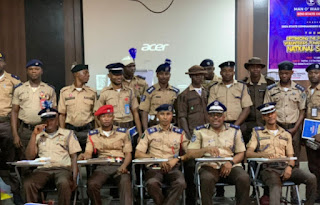Stakeholders call for ethics literacy education for researchers
By Isaac Eranga
Lagos: Stakeholders comprising researchers, research ethicists, health research ethics committee members, civil society groups, academics, philosophers, advocacy groups and the media have advocated for a comprehensive research ethics literacy education program among social/behavioural and biomedical researchers in Nigeria. They said this will help enhance their roles as researchers in their various disciplines.
They made this call at the 2018 Annual International Bioethics Forum held recently in Lagos. The Forum which had as its theme, Bioethics, Vulnerability and Protection from Exploitation in Research, was organised by the Bioethics Society of Nigeria (BESON), in collaboration with the New HIV Vaccine and Microbicide Advocacy Society (NHVMAS), with support from the Deepening Research Ethics in Nigeria (DREIN) project, a consortium consisting of Center for Bioethics and Research (CBR), National Agency for
Food and Drug Administration and Control (NAFDAC), Council on Health Research for Development South Africa, (COHRED) and the National Health Research Ethics
Committee of Nigeria (NHREC).
The Chairman of NHREC, Prof. Zubairu Iliyasu while welcoming participants to the event said the 2018 theme was very important because it delve into the protection of human and non-human participants in research. He called on research ethics committees that have not renewed their membership with NHREC to do so in order to enjoy speedy review and approval of their research protocols.
Prof. Iliyasu also urged the participants to embrace DREIN project as it aimed at strengthening the research ethics review and clinical trials oversight system at the Federal Ministry of Health of Nigeria by providing short, medium- and long-term training and mentoring of the administrative and technical staff of Research Ethics Committees (RECs) in Nigeria.
According to the NHREC boss, "the other aims of the project are: enhancing capacity of institutional RECs in Nigeria by providing blended 2 months long research ethics diploma training in collaboration with the Centre for Bioethics and Research, Nigeria for members of institutional RECs; improve the capacity of REC in Nigeria to implement standardized and efficient review of research and clinical trials protocols".
Speaking on the topic, vulnerability and exploitation in clinical and non-clinical research: ethical considerations for Africa, Prof. Godfrey Tangwa from Cameroon, highlighted the solutions bioethics offer to the problems of vulnerability and exploitation. He also expounded on sections within local and international policies and guidelines like the Helsinki's declaration and the CIOMS (2016), addressing issues related to vulnerability and exploitation in research.
"We can avoid vulnerability in research through, rigorous scientific and ethical review of research protocols; supporting legal, human rights and advocacy framework; enabling liberal and democratic environment and political will. This can only be made possible through extensive research ethics education", he said.
Dr. Bridget Haire from Australia, spoke on vulnerability and offshore clinical research: concept, context and application. She gave money and population as reasons while clinical trials go off-shore. She said vulnerability in public health refers to the health of communities and population.
The forum had four planaries, different session topics, abstract driven sessions and rapporteur session.
Photo:
NHREC boss, Prof. Zubairu Iliyaau




Comments